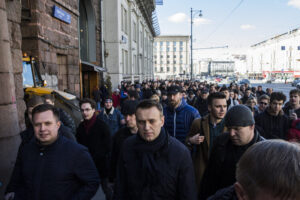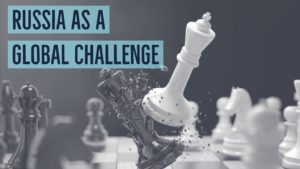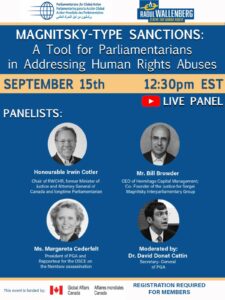
Alexei Navalny. Credit: Wikimedia
Russia’s foreign minister said Wednesday that Moscow will respond in kind to the European Union’s sanctions over the poisoning of Russian opposition leader Alexei Navalny, The Post reports:
Last week, tests conducted at labs designated by the Organization for the Prohibition of Chemical Weapons confirmed that the poison used on Navalny was Soviet-era Novichok. Navalny asserted that his poisoning couldn’t have been ordered without Putin’s involvement, an accusation the Kremlin vehemently denied.
Navalny’s no-nonsense messaging precisely undermines Putin’s propensity to play a superior and omnipotent ruler, a pose that looks increasingly incongruous amid Russia’s fast-multiplying troubles, adds analyst Pavel K. Baev. Promises of a miraculous coronavirus vaccine, which Putin incessantly repeats even as he takes every possible precaution to eliminating his own exposure to the pandemic, ring shallow, he writes for The Jamestown Foundation:
At the same time, Putin cannot communicate with new leaders like [Belarusian protest leader Svetlana] Tikhanovskaya or, for that matter, Armenian Prime Minister Nikol Pashinyan, who led the 2018 “Velvet Revolution.” The Russian president can offer no prescription for the angry street demonstrations in Minsk, Khabarovsk or Bishkek. He clings to an imaginary glorious past, refusing to see in it the invariably inglorious end to autocracy.
Regional instability in Belarus, Nagorno-Karabakh and Kyrgyzstan is also undermining Putin’s authority, observers suggest.

National Endowment for Democracy
“For Putin, practically his entire mission and his vision of Russian greatness and success revolve around his foreign-policy agenda,” said Tatiana Stanovaya, a nonresident scholar at the Carnegie Moscow Center. The new series of crises, she went on, “will very much distract Putin from domestic problems.”
Is Germany turning against Russia? The Times asks. Its longtime approach, known as “Wandel durch Annäherung” (“change through rapprochement”) …. held for decades. As recently as 2008, the foreign minister — Frank-Walter Steinmeier, today the president of Germany — heralded a “Modernization Partnership” promoting the “great goal” of a “European peace order stretching from the Atlantic to Vladivostok.”
That strategy is being questioned in Berlin, but Europeans remain more  hesitant to confront the Kremlin, others contends.
hesitant to confront the Kremlin, others contends.
To date, neither Berlin nor Paris has attributed the Navalny assassination attempt to the Russian government, and the European Union has yet to adopt a sanctions tool comparable to the Magnitsky Act,” notes Russell A. Berman, a senior fellow at the Hoover Institution.
“Meanwhile, French president Emmanuel Macron, in his efforts to burnish his own foreign policy credentials, has pursued an unconditional reengagement with Russia,” he writes in “The Dilemma of America’s Strategy for Europe,” an essay for The National Interest:
The point is that both Germany and France prefer to minimize damage to their relations with Russia. Any American proposals to confront Moscow more forcefully will therefore contribute to a deterioration of relations with our trans-Atlantic allies. The wrong steps by Washington could even push them toward Moscow and into what used to be called ‘Finlandization’ during the Cold War, a de facto subordination to Russian hegemony.
American Purpose hosts a conversation “The Shape of a Post-Putin Russia”—Mikhail Khodorkovsky with Elisabeth Braw and Larry Diamond. Friday, October 16 at 12 noon EDT.
Register here.







